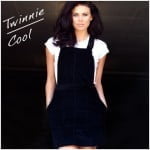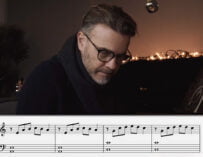
Thomas Mizer (right) and Curtis Moore: “Think about bite-sized bits that can be used in 15, 30 and 60-second segments but can still convey a complete experience.” Photo: Xanthe Elbrick
The Emmy-nominated songwriting duo, renowned for their work on Amazon’s ‘The Marvelous Mrs. Maisel’, share the secrets of their success
An accomplished and award-winning writing duo, the music of Thomas Mizer and Curtis Moore has been heard on stage and screen around the world. With theatrical credits including Triangle, The Legend Of Stagecoach Mary and The Bus To Buenos Aires, the pair have also found huge success writing for the Amazon Prime Video period comedy-drama The Marvelous Mrs. Maisel.
Back in 2019, Mizer and Moore wrote five original compositions for the show’s fourth season. Of those songs, One Less Angel, was nominated for a 2020 Primetime Emmy for Outstanding Original Music and Lyrics. Further new material can be heard in the show’s recently released fifth season (and they’ve already been signed up for the final sixth season).
Drawing from their Maisel experience, Mizer and Moore have these tips for anyone looking to successfully write songs for TV…
1. LONG STORY SHORT
When people think of writing for TV and film, they often imagine the holy grail of placing existing songs as needle drops. But there’s another major need for songwriters: working with a show to create material specific to a story. And story is the key. You are there to serve the story. Everything flows from the script and every tip that follows is a variation on this golden rule (so you could stop reading now but, heck, we’ll try to keep it fun so you stick around).
We started in musical theatre so we were already whipped into being semi-selfless, but if you’re used to being a solo singer-songwriter – congratulations, you’re in a band now. You are a collaborator, no more or less important than the actors or costume designer or the craft service guy with the barrels of caffeine. It’s not about you; it’s about the characters and their journey in the story being told. Your one and only job is to think about what you can contribute to help make that story sing. Literally.
2. RESEARCH, RINSE, REPEAT
Though many songwriters were hiding in the chorus room during school, now you need to hit the books. Study the script (if you are lucky enough to actually get one) and/or the song briefs. Research the setting of the show AND the show itself. What other music have they used before? What are the rhythms of the series? What are the themes of the show? What is the larger story they are telling? All of these things will make you a smarter collaborator able to speak the language of the show.
For example, The Marvelous Mrs. Maisel is famous for its period-perfect evocation of the late 1950s and early 1960s, so we absolutely lived the music of the era. But more importantly, we noticed that – as period-appropriate as things are – details on the show are a little brighter, a little bolder, a little more… Maisel. So every song we write for the show we try to take what is true and turn it up to 11, adding a little theatrical oomph. That’s the kind of observation that makes the difference between writing a great song and writing the right song.

Mizer (right) and Moore: “Your one and only job is to think about what you can contribute to help make that story sing.” Photo: Xanthe Elbrick
3. GO METHOD
Once you’ve got all the research under your belt, you need to think like an actor…though don’t start practicing your Oscar speech just yet. Bring your heart to the table. Think about what the characters in the moment are feeling and how that makes you feel. Let that shared human truth come through, even if the song is playing in the background or is an ironic counterpoint to the moment on screen. Also, make the lyric active. Ask yourself what the singer or the character wants and how the song is helping them get it. Are they trying to convince someone of something? Are they seducing someone? Are they trying to hide something? Flat states of being (sad, lonely, and even excited) are dull; actions are dynamic and result in a change by the end of the song.
One of our most satisfying moments was in Season 3 with a song called No One Has To Know. The brief only said Shy was going to sing a romantic ballad at a concert. But we also knew from story outlines that he was hiding bruises from a terrible gay-bashing that he couldn’t let anyone know about. We wanted to thread the needle between an era-appropriate love song AND a song that let his heart speak, if only between the lines. Our personal connection to the moment, the character’s journey, and the needs of the script all converged to, hopefully, create more compelling drama.
4. WHO RUN THE WORLD?
On television, showrunners are in charge. They are extraordinarily busy and get asked a thousand questions per minute. If you need the showrunners’ input, make your question the easy one to answer. Be concise and try to speak in a language they will understand. And when they give you a note, grab it like a lifeline. The series is their baby; you are simply babysitting it for a bit.
The hardest and therefore most gratifying song we had to write for Season 4 was Maybe Monica, which a young Harry Belafonte sings at Shy’s wedding. Belafonte is an icon and has a world-famous catalog of amazing music. We thought, ‘Why in the world is he singing one of our songs?’ Nothing in the brief or script gave us more information and we wrote a lot of decent songs we threw out. Then brilliant showrunner Amy Sherman-Palladino gave us a simple note, ‘It’s not a pop song from one of his records; it’s a toast he’s giving at the reception.’ Suddenly, it made sense. This was Harry and his band having fun and writing a personal song as a gift. It should be filled with good-natured ribbing, like a best man’s speech. It may be reminiscent of one of Belafonte’s Calypso songs, but it’s looser and cheekier. It’s really about character and the moment and…drumroll…story. That was a song we could write.
5. MAKE IT BITE-SIZED
At last, here’s a note that is technical and music-y and not all touchy-feely! It is very rare for original songs to be played in full unless you’re working on a musical. So help the music editors out and write a song that is modular. Think about bite-sized bits that can be used in 15, 30 and 60-second segments but can still convey a complete experience. Make sure sections can be cut and still elide with others sections. Keep inner cadences simple and be hook forward.
With City Lights in Season 4, the song is purposefully written in short verses that get to the hook quickly. Though the whole song was choreographed and filmed, they ultimately cut the bridge and tacked the coda onto the second verse to keep the pace of the episode moving. The way our song was built allowed them to have multiple options in the editing room. (And after a few private tears, we were OK with it because…it’s about story. Yeah. We warned you.)

Mizer (right) and Moore: “Be kind. Be present. Be respectful.” Photo: Xanthe Elbrick
6. TAKE THE OPTION UP
It’s hard for most non-musicians to talk about music. Instead of struggling to find the right words, give them options. It is much easier to discuss something that exists than some hypothetical song! And, with time at a premium, it is often much faster to get to a final approved song if you aren’t going in circles “improving” just one option.
For every single song you hear on Maisel, we have written probably four or five others for the same moment. This doesn’t mean we write multiple finished and arranged five-movement symphonies for every brief. We tend to write a few “songlets” at first, maybe a verse and chorus, with each option showcasing a variation in groove or lyrical point of view. We send the options to show creators Amy and Dan and let them talk about what feels right. Sometimes, we synthesize what worked from different songs into a new piece. Most of the time, one choice will be an immediate, ‘That’s it!’ and we will then go flesh it out. But even in this case, all those, ‘Not quite,’ songs are necessary to show off what is right about the song they pick. Sidekicks help the hero shine brighter.
7. DEMO, DE’ MERRIER
Now for some music nerding out! Ideally, we want our demos to sound well-produced, and give a listener a sense of what the song could be. When we work, we aren’t trying to make a final record, but we are trying to make something that will catch the ear without requiring too much imagination. For example, for a quick down-and-dirty way to finish off our demos, we throw on some simple mastering compression and some aggressive limiting before we bounce.
It’s always a balancing act between what you can afford or have time for and what actually makes a difference to the listener. If you don’t have production skills or access, skip saving up money for expensive computers and software, and focus those dollars on hiring someone to help you with demo recording. If you do it yourself, don’t get caught in the trap of trying to keep up with the Joneses when it comes to technology; get and learn only what you need for your project. Remember, ultimately, it’s how it sounds to your showrunner/producer and not what you used to create it. Do what you can to remove the biggest obstacles to a pleasurable listen and let the song shine through. But, of course, remember that the best software in the world won’t write the song for you…yet.
8. KINDNESS COUNTS
Here’s the deal: there are a lot of very talented people out there. When producers are choosing between two composers with similar experience, they will choose the one with whom they can imagine spending 18 hours in a tiny, over-air-conditioned recording studio, without wanting to strangle them. Be kind. Be present. Be respectful. Attitude makes the difference between getting hired and hired back.
And the kindness goes toward everybody on that set, in the office, and in the studio. First, everyone on a project talks to each other like you’re back in a freshman dorm. Most importantly, everybody is on the same team and working long, sometimes challenging hours to do one thing…to try to tell a great story. When by some miracle all those disparate pieces and skills come together, there is nothing more rewarding.
9. WORK WITH THE BEST
Finally, here’s a tip that you may not have control over but, wow, does it make the difference. Work with the best people in the business; find people who are better than you and soak up the knowledge. From Amy and Dan and music supervisor Robin Urdang to music producer Stewart Lerman and music editor Annette Kudrak; from the incredible singers to the world-class musicians, Team Maisel cares about getting the music right. They also provide us with the resources and tools to be our best. And when we aren’t our best, they cover it up with skill and dedication and some really magical pink fairy dust. We are in their debt.































Related Articles